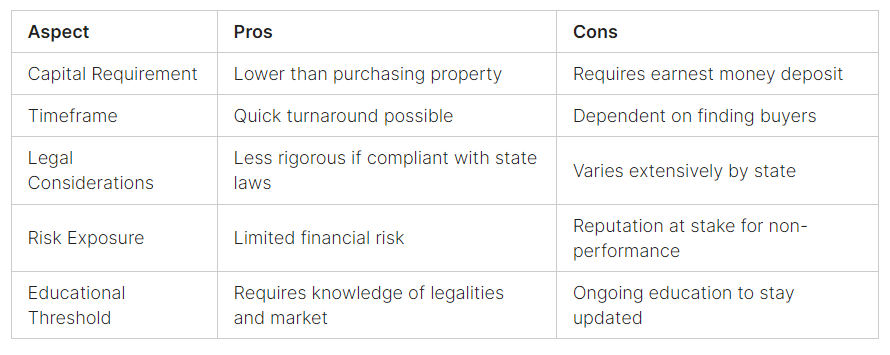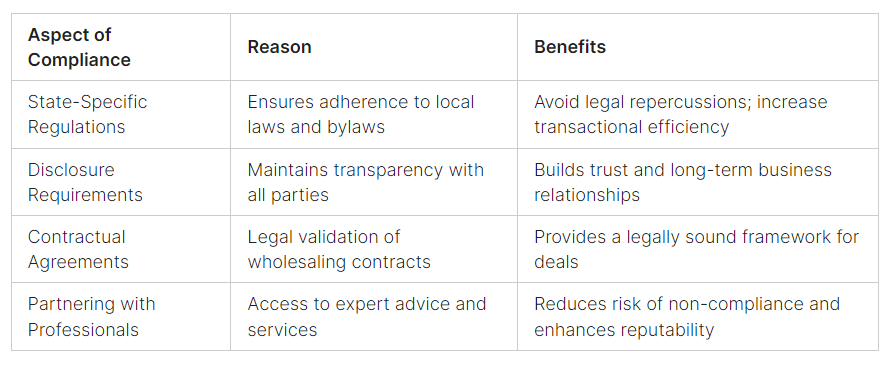Imagine discovering a lucrative real estate investment approach, only to find out it's not permissible in your state. This is a real scenario for many investors who dabble in real estate wholesaling. As you delve into the world of property investments, understanding the legal status of real estate wholesaling is crucial. But do you know which states allow real estate wholesaling and which don't? Or why some regions have embraced it while others haven't? In the evolving landscape of property investment, the answers to these questions could redefine your investment strategies.
Real estate wholesaling often exists in a gray area of the law; however, there are states where real estate wholesaling is legal. Unraveling the intricacies of real estate wholesaling legality by state can be the difference between flourishing in this competitive market and inadvertently stepping into legal trouble. Your journey into real estate investment necessitates a comprehensive grasp of the legal real estate wholesaling states, ensuring your endeavors are both profitable and compliant with state laws.
In this informative piece, we lift the veil on the states permitting real estate wholesaling, providing you with the insights needed to make informed decisions and stay ahead in the game. Buckle up as we navigate through the legalities and geographies that could dictate the success of your next real estate conquest.
Key Takeaways
- Identify which states have deemed real estate wholesaling a legal investment strategy.
- Understand the importance of complying with varying state regulations in real estate wholesaling.
- Gain an overview of how real estate wholesaling operates legally across different regions.
- Discover the potential risks and ramifications of ignoring state-specific wholesaling laws.
- Equip yourself with the knowledge to spot lucrative wholesaling opportunities in compliant states.
The Basics of Real Estate Wholesaling
Exploring the realm of real estate wholesaling uncovers a strategic avenue for investors seeking to capitalize on market opportunities. As an investment technique, wholesaling involves an agreement with a home seller followed by transferring that contract to a buyer, which requires a firm grasp of the legal guidelines for real estate wholesaling.
Understanding Real Estate Wholesaling
At its core, real estate wholesaling is a swift transactional process that allows an individual, the wholesaler, to facilitate the sale of a property without ever holding the title. Your objective as a wholesaler is to contract a home at a lower price and sell the contract to another buyer at a higher price, thereby profiting from the difference. Recognizing where to wholesale real estate legally ensures the wholesaler avoids the pitfalls of non-compliance.
How Wholesaling Differs from Traditional Real Estate Sales
Unlike traditional real estate sales where the actual sale of property transpires, wholesaling distinctively stands out by involving merely the right to purchase the property. This method foregoes the need for significant capital investments or ownership, making it an attractive option for investors with limited funds. The intricacies of real estate wholesaling laws by state need to be navigated carefully to maintain lawful operations.
The Pros and Cons of Wholesaling for Investors
Wholesaling presents a unique set of advantages such as low entry barriers and the potential for quick returns. However, it demands an in-depth understanding of real estate markets and robust networking skills. The downside includes market volatility and the legal complexities associated with each state, which require adhering to legal guidelines for real estate wholesaling. To illustrate these points, let’s consider a comparative analysis:

In summary, real estate wholesaling can be an enticing venture if tackled with due diligence regarding the legalities and market conditions. It’s critical to understand how the strategy unfolds, particularly within the legal frameworks of your targeted states.

States Where Real Estate Wholesaling is Legal
As you dive into the world of real estate investing, it's important to be aware of the terrain you're operating in—especially when it comes to legal considerations. Real estate wholesaling, a strategic approach to real estate investment, can be significantly impacted by state laws. Thankfully, there are a number of states permitting real estate wholesaling where you can conduct your business with confidence.
In these legal real estate wholesaling states, the practice is supported by legal frameworks that favour investment and entrepreneurship. Below is a guide to the regions that are relatively welcoming to wholesalers, reflecting the current legal landscape and giving you an edge in deciding where to focus your wholesaling efforts.
- Alabama
- Colorado
- Georgia
- Indiana
- Iowa
- Kansas
- Maine
- Massachusetts
- Mississippi
- Missouri
- New Mexico
- North Dakota
- Wyoming
It's essential to note that within the states where real estate wholesaling is legal, there may still be specific regulations and processes that need to be adhered to. Whether examining assignment contract laws, double closing requirements, or mandatory disclosures, understanding these nuances can be pivotal to your success.
To navigate the legal aspects of wholesaling, it's recommended to seek out local experts and legal professionals. Their insider knowledge can help you manage and mitigate potential risks, ensuring that your investments remain within the bounds of the law while exploring dynamic strategies to grow your portfolio.
Understanding the regulations unique to each state can empower you to make informed decisions that align with your investment goals. Keep in mind, however, that laws can evolve, so always stay up-to-date with the most current information to ensure the legality of your wholesaling activities.
Navigating Legalities of Real Estate Wholesaling
As you delve into the world of real estate wholesaling, understanding and navigating the intricate legalities that vary from state to state is pivotal. Ensuring your investment strategies are within legal bounds is not only necessary for ethical practices but is also paramount for the sustainability and growth of your real estate endeavors.
Understanding State Regulations
The legal framework that governs real estate wholesaling varies distinctly across the legal real estate wholesaling states. Each jurisdiction may have its set of norms and bylaws which dictate the specifics of wholesaling. Familiarizing yourself with these nuances is the bedrock of a legitimate wholesaling business. Whether it's states with savvy investors or those new to the arena, being informed about state-specific regulations will facilitate smoother transactions.
Compliance with Real Estate Laws
Compliance with real estate laws is the cornerstone of executing legal real estate transactions. Depending on the real estate wholesaling legality by state, you may face different filing requirements, legal disclosures, and contractual obligations. To navigate these complex legal roadmaps, it's essential to stay updated with legislative changes and understand how they affect your wholesaling activities. By doing so, you not only avert potential legal pitfalls but also bolster your position as a credible professional in the real estate market.
Working with Licensed Professionals
Partnering with licensed professionals ensures adherence to best practices within the industry. This collaboration, whether with real estate attorneys, brokers, or agents, can provide a safeguard through their expertise in compliance with real estate laws. They possess the legal acuity necessary to confirm that each transaction you undertake complies with state-wise regulations, thus mitigating risks and fortifying the wholesaler's repute.
An in-depth understanding of the legal intricacies of real estate wholesaling is not merely a recommendation but a necessity. Compliance and professional alliances fortify a wholesaler's capacity to operate legally, professionally, and successfully. Below is a helpful reference table summarizing key areas where legal compliance in real estate wholesaling is paramount.

By grasping the essentials outlined above and continuously consulting with knowledgeable experts, you can assure that your real estate wholesaling business flourishes within the bounds of the law.
Benefits of Wholesaling in Permissive States
In discerning the benefits of real estate wholesaling, it becomes evident that operating within states where real estate wholesaling is legal not only aligns with savvy investment practices, but it also amplifies the potential for significant financial gains. Investors in these legal real estate wholesaling states enjoy the advantage of streamlined transactions, mitigated by an understanding and supportive legislative framework. These conditions foster an environment where you, as an investor, can capitalize on opportunities with confidence, knowing that your dealings are backed by the rule of law.
One of the primary benefits you'll discover is the heightened potential for profit. Since the legal hurdles are minimized, investors can focus on the acquisition and transfer of contracts, reducing time and resources typically allocated to navigating complex compliance issues. This efficiency translates into the ability to execute multiple deals within a short timeframe, thereby expanding your investment portfolio and increasing your overall profitability.
Moreover, the reduced regulatory burdens in permissive states mean that you will encounter fewer barriers to entry and exit in property deals. This nimble approach to investing is particularly attractive to those who seek to make fast-paced transactions without the encumbrance of extensive red tape. In essence, understanding and leveraging the possibilities inherent in wholesaling in these legal jurisdictions can set a strong foundation for enduring success in your real estate ventures.



Comments ()